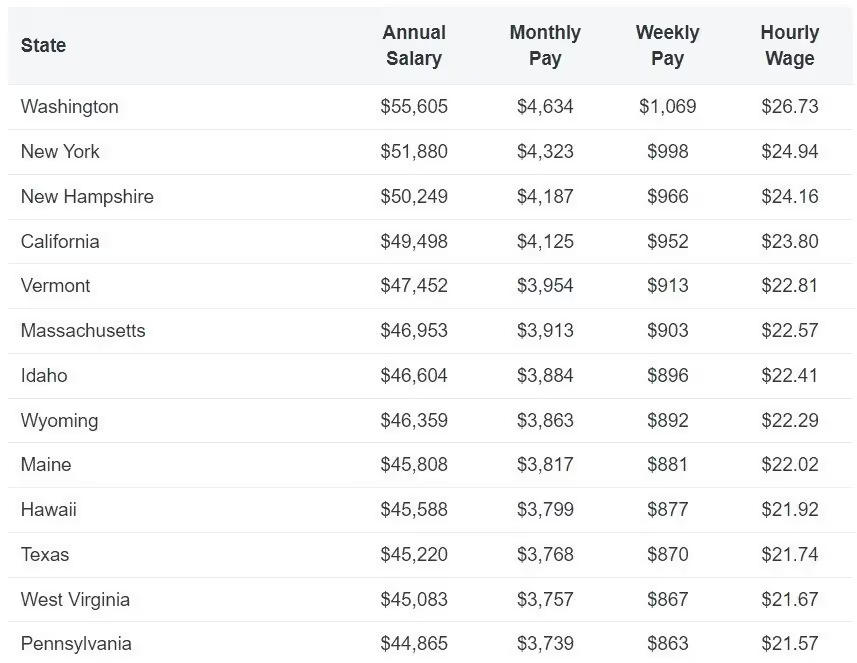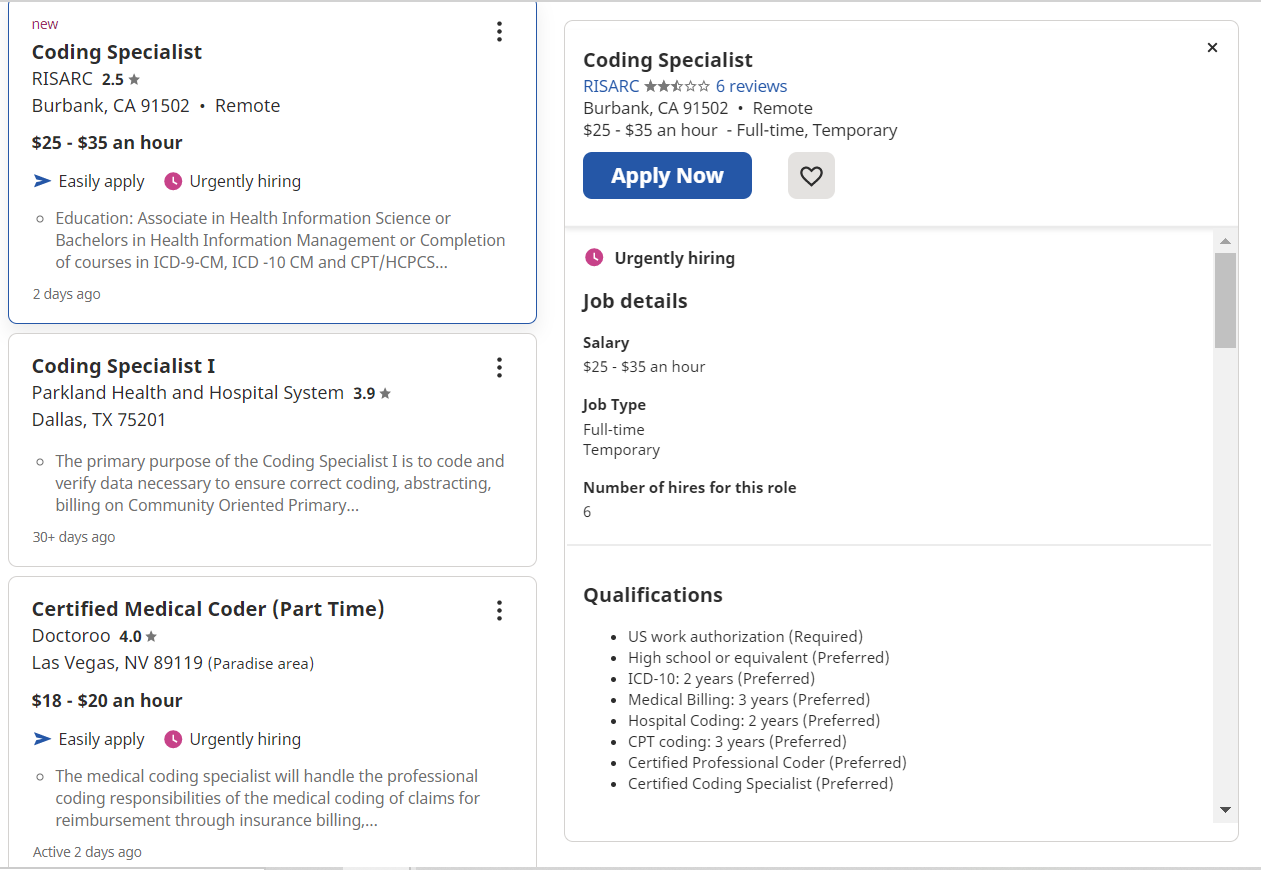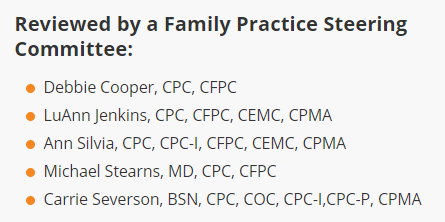5 Top-Tier Certifications for Medical Coders
For this blog post I breakdown the 5 most popular medical coding certifications that you could get to help you specialize in the medical coding field.

What is one of the best ways for medical coders to increase their income? The answer may surprise you: certifications.
Depending on the certification, those extra letters at the end of your name could mean a $5,000 difference in your yearly paycheck. It could even be a $25,000 pay upgrade. Don’t believe me? Buckle up.
The beauty of the medical coding field is that bettering yourself won’t take the time nor the money compared to other industries. Many people study for certifications after work hours and most of them cost less than $400.
Specialization means that you stand out. As you continue to boost your skills within your field, hiring organizations will have less of a talent pool to draw from, making you the perfect candidate.
The more certifications you have, the more you specialize, and the more knowledge you have about specific sections of the medical coding industry.
It also means you have more bargaining power over your salary as certifications stand out on your resume, which is always a great position too.
I know by now that the information I’ve provided thus far has you interested in learning more. For this blog post I breakdown the 5 most popular medical coding certifications that you could get to help you specialize in the medical coding field.
I’ll take you through what each exam looks like, how many jobs are available nationwide for the different certifications, and how your income could change based on passing a single test.
Professional Coder Certification (CPC)
The Professional Coder Certification, also known as CPC, has an exam available internationally. This certification is essentially the gold standard for physician-based medical coding. Once achieved, you’ll receive recognition for being reliable and that you’ve mastered the art of medical coding.
Why get the certificate? Well, you don’t just seek it only to be able to add “CPC” to the end of your name but to receive a salary increase as well. According to ZipRecruiter, CPC’s received a $55,605 salary on average.

Even more exciting is the fact that this type of job should grow by 22% through 2026. In other words, medical coding isn’t a dying career like some of the rumors you may have heard.
At this point, you might be thinking to yourself, “So I could get a serious pay raise if I get this certificate. But how many jobs actually need this certificate?”
Answer: A ton
If you were to search CPC on Indeed and expand the search to the entire United States, you would have over 3,500 jobs listed. This number includes full-time positions, remote positions, hourly wage, and salary positions.

So what does the exam look like?
The exam is available in two formats: online or in person. The fees, time, number of attempts, and time allowed varies between in-person tests and online tests. The price of the online exam is $299 and the test of the in-person exam is $399.
To pass the test you have to answer a minimum of 105 questions correctly. Topics include terminology on surgical procedures performed on different parts of the body, anesthesia, radiology, laboratory/pathology, anatomy, ICD 10 and diagnoses, coding guidelines, and more.
Outpatient Hospital/Facility Certification (COC)
Physicians are moving away from private practices and towards hospital groups and outpatient facilities. In order to be a medical coder in these environments, you need to be a certified outpatient coder.
If this is confusing, it might help if I tell you that this certification was formerly known as CPC-H by the AACP.
Now let's look at jobs before we even talk about the test.
If you were to search “COC” in the “United States” on Indeed, you would get a massive list of over 2,300 jobs. This includes full-time, part-time, and contracted positions anywhere in the US.
At the time of writing, I found results in California, Texas, and Nevada in the first 10 openings on the list. After all, location matters as it can affect your income.

With the COC certification, your salary could increase to an average of $65,000 a year. This certification is one of the highest-paying, making it ideal for individuals who want to be an outpatient coder.
The exam features:
- 150 multiple-choice questions (proctored)
- 5 hours and 40 minutes to finish the exam
- One free retake
- $399 with one free retake
- Open codebook (manuals)
The exam covers topics like medical terminology, anatomy, coding guidelines, payment methodologies, ICD-10 medical codes, and more.
Inpatient Hospital/Facility Certification (CIC)
This is the only certification dedicated exclusively to an inpatient hospital or facility coding.
The AACP mentions that someone with this credential can earn 40% more than people without the CIC certification.
But, is this exaggerated?
The average annual salary of a medical coder without any credentials is about $42,000. But someone with the CIC certification can make more than $63,000. That’s $21,000 more. What would you do with an extra 20 grand?
Now that you know you could earn so much more with this certification added to your credential inventory, how likely are you to get a job?
Back to Indeed.
If you search “CIC” with the location set to the genetic entirety of the United States, Indeed will pull up nearly 2,500 jobs.

So you want the extra money and you have plenty of job options. This is looking promising.
Let’s look at the exam.
The CIC exam features 60 multiple choice questions and 10 inpatient cases fill-in-the-blank questions. The exam has several proctors and should last 5 hours and 40 minutes. You do have one free retake, so if you mess up, your $399 fee can get you a little further. Also, the exam is open codebook, meaning you can have the manuals with you.
Risk Adjustment Certification (CRC)
A certified Risk Adjustment Coder has to be able to read a medical chart and assign the correct diagnosis codes. Because this job can affect the lives and paychecks of so many patients, achieving this certification may not be a bad idea.
The exam will cost $399 with one free retake. There are 150 multiple choice questions and you will have 5 hours and 50 minutes to finish the test. Like the certifications mentioned above, this exam is also an open codebook.
The CRC examination has questions mostly pertaining to using and applying ICD-10 medical codes used for risk adjustment coding. The exam covers several topics: compliance, diagnosis coding, improving documents, and medical terminology. It also includes the topics of anatomy, pathophysiology, risk adjustment models, quality care, and more.
Someone with the CRC certification receives an average of $64,900 a year. This is quite the contrast compared to the 2019 medical coder average (without any certifications) of $54,900. That's a $20,000 increase for a text that costs less than $400.

In terms of job availability, Indeed says that there are currently over 3,500 that require the CRC certification in the United States.
Family Practice Coder Certification (CFPC)
The CFPC is one of many specialty certifications listed on the AAPC website. As I mentioned in the introduction, specialty certifications can mean a greater pay raise compared to other certifications.
In order to take the exam, you must schedule the examination 4 weeks in advance and must have a current AAPC membership. The AAPC recommends that the candidate have at least two years of experience since the exam is difficult and isn’t designed for people with minimal coding experience.
The exam consists of 150 multiple choice questions during a proctored, 5 hour and 40 minute period. There is one free retake within 1 year of the first attempt. The exam is an open codebook kind of exam, but don’t think that makes the exam any easier to complete!y.
The exam has a committee of 5 individuals that reviews the exam answers.

As you can see, all of the individuals above have accreditations with the CPC certification and 4 of the 5 individuals are CFPC certified.
The exam covers several topics, including time-based coding, medical terminology, anatomy, and physiology. It also includes the rules and regulations of Medicare billing, coding of ancillary procedures performed in family medicine, and even the coding of minor surgical procedures performed in family medicine.
Conclusion
Hopefully, you’re now convinced that adding one of the many certifications listed above to your repertoire will bring you many advantages. You can get better-paying jobs, be more competitive in the job market, and help patients in specific sections in healthcare.
You’re not alone in wanting to better yourself and your career. The medical coding field has so many people just like you who are more than willing to give you advice and see you become a better version of yourself.
In fact, there are study groups that exist where you can get help from other professionals. You can find groups of people with similar positions, goals, and ambitions on LinkedIn and Facebook. One Facebook group has almost 4,000 members! Maybe you’ll even convince a group member to lend you a study book!
Emphasize your product's unique features or benefits to differentiate it from competitors
In nec dictum adipiscing pharetra enim etiam scelerisque dolor purus ipsum egestas cursus vulputate arcu egestas ut eu sed mollis consectetur mattis pharetra curabitur et maecenas in mattis fames consectetur ipsum quis risus mauris aliquam ornare nisl purus at ipsum nulla accumsan consectetur vestibulum suspendisse aliquam condimentum scelerisque lacinia pellentesque vestibulum condimentum turpis ligula pharetra dictum sapien facilisis sapien at sagittis et cursus congue.
- Pharetra curabitur et maecenas in mattis fames consectetur ipsum quis risus.
- Justo urna nisi auctor consequat consectetur dolor lectus blandit.
- Eget egestas volutpat lacinia vestibulum vitae mattis hendrerit.
- Ornare elit odio tellus orci bibendum dictum id sem congue enim amet diam.
Incorporate statistics or specific numbers to highlight the effectiveness or popularity of your offering
Convallis pellentesque ullamcorper sapien sed tristique fermentum proin amet quam tincidunt feugiat vitae neque quisque odio ut pellentesque ac mauris eget lectus. Pretium arcu turpis lacus sapien sit at eu sapien duis magna nunc nibh nam non ut nibh ultrices ultrices elementum egestas enim nisl sed cursus pellentesque sit dignissim enim euismod sit et convallis sed pelis viverra quam at nisl sit pharetra enim nisl nec vestibulum posuere in volutpat sed blandit neque risus.

Use time-sensitive language to encourage immediate action, such as "Limited Time Offer
Feugiat vitae neque quisque odio ut pellentesque ac mauris eget lectus. Pretium arcu turpis lacus sapien sit at eu sapien duis magna nunc nibh nam non ut nibh ultrices ultrices elementum egestas enim nisl sed cursus pellentesque sit dignissim enim euismod sit et convallis sed pelis viverra quam at nisl sit pharetra enim nisl nec vestibulum posuere in volutpat sed blandit neque risus.
- Pharetra curabitur et maecenas in mattis fames consectetur ipsum quis risus.
- Justo urna nisi auctor consequat consectetur dolor lectus blandit.
- Eget egestas volutpat lacinia vestibulum vitae mattis hendrerit.
- Ornare elit odio tellus orci bibendum dictum id sem congue enim amet diam.
Address customer pain points directly by showing how your product solves their problems
Feugiat vitae neque quisque odio ut pellentesque ac mauris eget lectus. Pretium arcu turpis lacus sapien sit at eu sapien duis magna nunc nibh nam non ut nibh ultrices ultrices elementum egestas enim nisl sed cursus pellentesque sit dignissim enim euismod sit et convallis sed pelis viverra quam at nisl sit pharetra enim nisl nec vestibulum posuere in volutpat sed blandit neque risus.
Vel etiam vel amet aenean eget in habitasse nunc duis tellus sem turpis risus aliquam ac volutpat tellus eu faucibus ullamcorper.
Tailor titles to your ideal customer segment using phrases like "Designed for Busy Professionals
Sed pretium id nibh id sit felis vitae volutpat volutpat adipiscing at sodales neque lectus mi phasellus commodo at elit suspendisse ornare faucibus lectus purus viverra in nec aliquet commodo et sed sed nisi tempor mi pellentesque arcu viverra pretium duis enim vulputate dignissim etiam ultrices vitae neque urna proin nibh diam turpis augue lacus.




